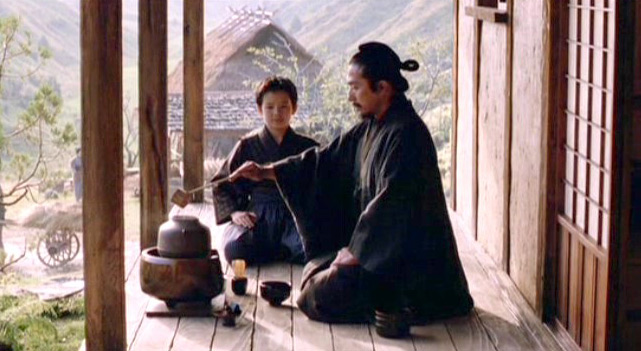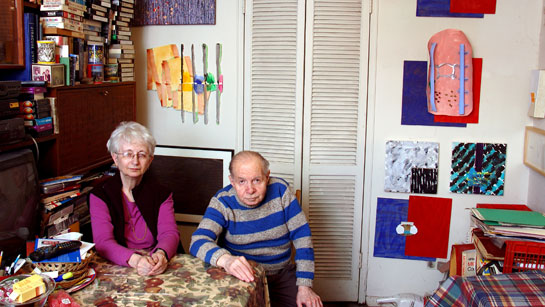Today I want to talk about perfection, and how it does or doesn’t relate to progress. Each of us are juggling a million things each week, and seeking perfection can often stand in the way of getting things done.
But I often find myself considering the value of focus, or seeking perfection, and of the downsides of what we sometimes call “progress.” If you are a writer or a publisher, I imagine this might relate to how you find your role changing as digital media evolves our behaviors and capabilities. That we all feel pressure to do more, to leverage more, to focus more on spreading ourselves thinner and thinner, and less on taking the time to produce a single work of exceptional quality.

The above image is a scene from The Last Samurai featuring the ritual of a tea ceremony. It’s image that I try to keep in my mind often. The character here has devoted his life to this ritual, to perfecting the craft of tea. I always consider it in terms of how I approach my daily life – how I can become more focused on delivering exceptional value in my business. How can I focus on fewer activities, and do them exceptionally well?
My friend Catherine Carr shared an interesting Tweet this week:
I understand this idea – that sometimes the search for perfection can ensure that we never get anything done. That oftentimes “good enough” is enough to get an important project started, and can lead to very important accomplishments.
But…
What if sometimes accomplishment is not really progress at all; that we must judge quality, not just quantity.
For instance: the toaster you bought 40 years ago was heavy duty metal, big, one function, easily repairable and lasted forever. New toasters are cheap plastic, have millions of options, and when they break, you throw them away. Is this progress? Oh, there still is a nice heavy duty single function toaster on the market:
This Dualit toaster costs $340 from Amazon, marked down from its retail price of $380. I picked up one of these at a yard sale a few years back for $45. It’s the centerpiece of our kitchen counter. I can’t see doing the same with a “Back to Basics” Egg-and-Muffin 2-Slice Toaster and Egg Poacher:
I love how the “back to basics” brand name tries to ride the simplicity trend, but designs a product that is akin to Rosie the Robot from The Jetsons.
Is there something wrong with doing just one thing very well? In not following 100 paths, even if they are all fun and worthwhile. Having the discipline to do one thing exceptionally well. Not rushing around doing more and more, always “unlocking value” – finding ways to shove more into our day, and eek out every last bit of “value” from everything we do or own?
That focus and limits can help us become better at what we do, and accomplish greater things over the long term.
Let’s look at some examples…
Greatness Sometimes Has Nothing to Do With Progress
Many of the people I admire were not innovators. They simply did one thing very very well. An easy example is Michael Jordan, in this classic commercial:
His goal was not to reinvent sneakers, create new ways to play the game, make a fortune off merchandising, realign pay structures, enable new leagues or anything like that. Sure, some of those things happened because of him, but he just focused on getting the ball in the hoop.
A great counterpoint to this is my band. What? You haven’t heard of my band? Maybe that’s because in the years we played together during and after college, we spent more time shopping for cool gear and fiddling with it all, than we did really learning our instruments and writing songs. Somewhere I have hundreds of hours of recordings of cool sounds, none of them arranged into any kind of coherent songs.
Is perfection possible? Car maker McLaren tried to find out with their F1 super car in the 1990’s. Jay Leno, an avid car buff, calls it “the greatest car of the 20th century.”
It opts for basics, with no power steering or traction control – Leno mentions how it’s like driving a go kart. Every single part in the car is designed and manufactured by McLaren. That’s incredible in this age where we outsource everything.
Here’s a video where Jay takes a tour of the McLaren factory:
Sometimes We Justify Compromises
Not compromising can be VERY expensive. That is why a McLaren costs hundreds of thousands of dollars, if you can even get one of the few they produce.
Oftentimes, compromise is something that is necessary in order to live our lives. We balance family, work, hobbies, social life, and mowing that lawn.
Yet, removing obligations allows us to focus our energy. This is one reason that my wife and I rent instead of own our home. I don’t have to mow the lawn, trim the hedges, repair the boiler, or shovel the walk. Instead – I spend more time rolling around on the floor with my son.
Compromise is often about resources and value. In another video, Jay Leno showed us a car that was given to him – an odd car from the 1950’s that was interesting, but ugly. He took it up as a cause, and will restore it at the cost of $25,000. When he’s done, the car will be WORTH $5,000 on the open market because it is not a collectible car.
Silly, right?
But maybe this is why an estimated 50% of early Hollywood films were lost – no one bothered to preserve or restore them. Those who focus their energies in this way can accomplish things that can’t be measured in traditional ways – money and power.
Perfection is hard. In the rush to accomplish things, we leverage a range of platforms and tools created by others. We can’t focus 100% of our energies on every small thing. It’s unlikely that you proofread every single email you send 10 times to ensure each word is perfect. But it is a choice we have – where to focus our efforts, what is worth doing exceptionally well, and what merely needs to get done.
But accomplishment alone is not a key indicator of happiness or success. The happiest people you meet are often those who have very little financial means. Some of the most unhappy people have lots of financial resources – but with it comes a personal expectation to do more, to live up to the external expectations put upon them.
How Focusing Can Be a Means for Differentiation
Something I find myself considering is how do I build quality into what I offer in my business. There are LOTS of people who do what do, and many of them are quite good. How do I differentiate myself? I suppose I try to offer something unique, and something VERY high quality.
One foundation of my business is teaching. I spent nearly an entire year developing my first online course: Build Your Author Platform. The first session just ended, and now I am taking a month to revamp it and improve it for when I offer the next session in June.
From what I have seen, this is the wrong way to build a business. If I wanted to scale immediately, if I wanted to maximize revenue, then I should be offering dozens of classes, different levels (bronze, silver and gold), be upselling ebooks and webcasts along with them. I should be “unlocking value.”
Instead I am obsessed with doing this one thing very very well. Will it be perfection? Nope.
But I am pushing myself again and again. I am asking for honest feedback – getting it – and apply it to help improve what I offer. I’m resisting the urge to be satisfied by survey responses that say my students feel the course has exceeded expectations. I want to raise their expectations even further, and exceed those.
Quality is often a process, not a destination, something you constantly strive for. And it’s a decision that each of us make every day, across the hundreds of things that we do. Inherently, focusing on quality is as much about what you DON’T do in your life, as what you do focus on. That your energy is finite, and creating something of unique value requires sacrifice.
Anyhow – let me know if I can help you build something uniquely valuable to you and your community.
-Dan






